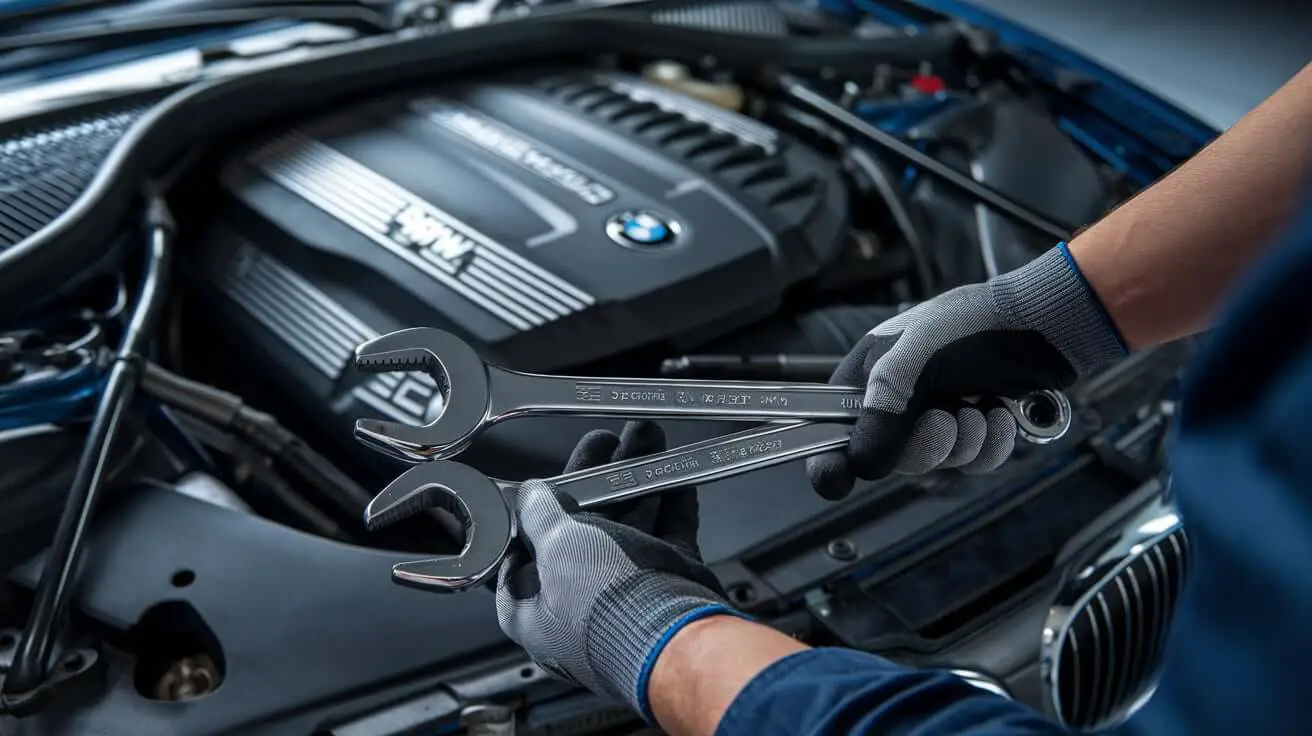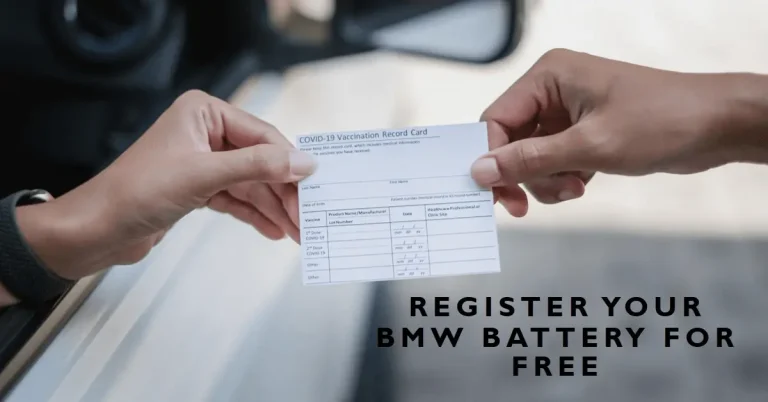What Type Wrenches Are Used On BMW Engine?
Working on BMW engines needs the right tools for proper maintenance and repair. BMW engine wrenches are made to fit these vehicles’ exact needs. It’s important to know which wrenches are needed for different jobs.
Having the right tools, like oil filter wrenches and torque wrenches, is key. It ensures your BMW engine lasts long and runs well.
BMW engines, like the N20, N26, and N51, need special tools for upkeep. Using BMW engine wrenches, such as a 36 MM Socket for oil filters, is important. It helps tighten bolts safely and correctly, following BMW’s standards.
Using the right tools for your engine means it gets the care it needs. This can make your engine last longer and perform better.
Essential Wrench Types for BMW Engine Work
Working on a BMW engine requires the right tools. Metric socket wrenches, torque wrenches, and open-end wrenches are key. A full metric socket set, from 6-22mm, is needed for different bolt sizes. Also, a full metric deep wall socket set is recommended to avoid missing sizes during repairs.
Torque wrenches are vital for precise tightening. This prevents damage to engine parts. It’s wise to have torque wrenches in 1/4″, 3/8″, and 1/2″ sizes. Open-end wrenches are also essential, as they fit in tight spaces where sockets can’t.
Key Wrench Types and Their Uses
- Metric socket wrenches: For bolts and nuts of various sizes, providing a versatile and essential tool for BMW engine work.
- Torque wrenches: Crucial for precise tightening, ensuring that bolts are secured to the correct specification, which is vital for engine integrity and performance.
- Open-end wrenches: Useful in tight spaces and for bolts that require a high level of precision and control, making them an indispensable part of any BMW engine toolkit.
Having these wrench types in your toolkit prepares you for many BMW engine tasks. From routine maintenance to complex repairs, you’ll be ready. Quality tools, like those from Craftsman, offer long-term benefits in durability and performance.
BMW-Specific Tool Requirements
BMW engines are complex, needing special tools for upkeep and fixes. German tools, made for BMW, are key for keeping engines running right. They help avoid damage and save money on repairs.
Tools like camshaft alignment tools and ball joint separators are made for BMW. They make maintenance easier and more efficient. Also, tools for BMW’s electrical systems, like fuse pullers, are a must.
Here are some must-have BMW tools:
- Timing tool set for correct engine timing
- E-torx socket sets for BMW parts
- Fan clutch nut wrenches for cooling system work
- Transmission fluid fill adapters for fluid checks
Using BMW tools ensures your car gets the best care. Always check BMW’s repair guides before starting any work. This keeps your car safe and well-maintained.
Specialty Wrenches for German Engineering
Working on German cars like BMWs needs the right tools. You’ll need E-socket wrenches, spline drive tools, and triple square sockets. These tools fit perfectly and provide the needed torque for high-performance vehicles.
E-socket wrenches fit into tight spaces easily. Spline drive tools offer great torque for precise tasks. Triple square sockets are key for BMW engines, ensuring a tight fit.
Common Applications
These specialty wrenches are used for many tasks. For example:
- Removing oil filter canisters might need a 36 MM socket.
- Removing wheel studs might need a 17 MM deep impact socket.
- Strut socket removal might need a special strut socket.
Tool Options
There are many tools available for these needs. Here are a few:
| Tool | Price | Source |
|---|---|---|
| 36 MM Socket | $25 | Eppys |
| 17 MM Deep Impact Socket | $12 | Eppys |
| Special Strut Socket | $25 | Bimmertools |
Having the right tools like E-socket wrenches, spline drive tools, and triple square sockets is key. They ensure a secure and efficient repair of your BMW engine.
Critical Measurements and Specifications
Working on a BMW engine means following the manufacturer’s guidelines. This includes knowing the torque values and wrench sizes. The BMW service manual lists these details for each engine part, making it easy to find what you need.
Using high-quality torque wrenches is key. Tools like ROUND DIAL TYPE commercial-industrial beam wrenches or tubular round types, known as ‘clickers’, are best. They give accurate torque readings, which is vital for parts like cylinder stud nuts and oil pan bolts. Always use the right type of torque wrench for tightening, not loosening, unless it’s a two-direction type.
Some important torque values for BMW engines are:
- Valve cover nuts: 10Nm (about 7.4 pound/feet)
- Cylinder stud nuts: need precise torque to seal properly
- Banjo bolts: must have specific torque to avoid engine damage
It’s also good to know how to convert torque values between measurement systems. This helps users apply the correct values. By sticking to these specs and using the right wrench sizes, you’ll do a great job. This keeps your BMW engine running well and lasting long.
Professional-Grade Tools vs Standard Options
Working on a BMW engine requires the right tools. You can choose between professional BMW tools and standard wrenches. Professional tools are better quality but cost more. Standard wrenches are cheaper but might not work as well.
Professional tools are made with high-quality materials. They are built to last through heavy use. Standard wrenches, while effective, might not be as durable.
Quality Differences
Professional tools offer high precision and accuracy. They are made for BMW engines’ specific needs. Standard wrenches are good but not as precise.
Price Considerations
Prices for tools vary. Professional tools are pricier but last longer. Standard wrenches are cheaper but may need replacing often.
Durability Factors
Durability is key. Professional tools last years. Standard wrenches are durable but not as long-lasting.
Some top tools include:
- Socket sets
- Torque wrenches
- Open-end wrenches
- Polydrive sockets
- BMW M62TU VANOS socket
| Tool Type | Professional-Grade | Standard |
|---|---|---|
| Socket Set | $100-$500 | $20-$100 |
| Torque Wrench | $50-$200 | $10-$50 |
| Open-End Wrench | $20-$100 | $5-$20 |
Common Engine Areas and Required Wrenches
Working with BMW engine parts means you need the right tools. Each engine area needs specific wrenches. For instance, valve covers and oil pans need metric socket wrenches like 16mm and 18mm. These sizes are often missing in cheaper sets.
A full metric socket set is key, covering sizes from 6-22mm. Using a 1/2″ impact set instead of normal sockets can prevent damage. Common sizes for BMW work include 8mm, 13mm, 22mm, 19mm, 18mm, and 16mm.
For BMW engine care, you’ll also need torque wrenches in metric. Tools like O2 sensor sockets and oil filter tools are specific. Power tools, like electric drivers and impact wrenches, save time in repairs. The right tools make BMW repairs smooth and efficient.
Some top tools for BMW work include:
- Craftsman tools, known for quality and a lifetime guarantee
- Snap-On tools, high quality but pricey
- Multiple extensions and a good ratchet for flexibility
- 6 point sockets for better grip
Tool Selection Based on BMW Series
Working on your BMW needs the right tools. Each BMW series has its own tool needs. For example, BMW 3 Series tools are for simple tasks like oil changes and brake pad replacements.
BMW 5 Series wrenches are for tougher jobs, like suspension and engine work. BMW 7 Series maintenance needs precise tools, like torque wrenches and socket sets.
3 Series Requirements
BMW 3 Series owners should have basic tools. This includes metric sockets, screwdrivers, and a ratcheting wrench. These tools are great for routine maintenance and small repairs.
5 Series Specifications
BMW 5 Series owners might need more tools. A breaker bar and socket swivels are good for suspension and engine work.
7 Series Tools
BMW 7 Series owners need a wide range of tools. This includes a hydraulic press, engine hoist, and master thread tap and die sets. These tools are essential for complex repairs and maintenance.
| BMW Series | Recommended Tools |
|---|---|
| 3 Series | Metric sockets, screwdrivers, ratcheting wrench |
| 5 Series | Breaker bar, socket swivels, torque wrench |
| 7 Series | Hydraulic press, engine hoist, master thread tap and die sets |
What Type Wrenches Are Used On BMW Engine: Complete List
Working on a BMW engine requires the right tools. A complete BMW wrench set is key for a smooth repair. Here’s what you’ll need:
A good BMW tools list includes socket sizes from 6mm to 22mm. You’ll also need torque wrenches and spline drive tools. Don’t forget 16mm and 18mm sizes, common for BMW engines.
Here are the essential tools for BMW engine work:
- Hand tools: socket set, wrench set, pliers, screwdrivers
- Power tools: 1/4″ electric socket driver, 3/8″ electric ratchet, 1/2″ electric impact
- Specialty wrenches: torque wrenches, spline drive tools, triple square sockets
Remember, safety gear like goggles and ear muffs is vital. Also, tools for organizing like a magnetic tray and chest are helpful. With the right BMW wrench set, you’re ready for any repair.
| Tool | Description | Price |
|---|---|---|
| KLANNKL-0415-0008 adapter | Used for BMW E36 and Mercedes W203 | $82.24 |
| Klann brake reset tool | For BMW Mini One, featuring the press KL-0112-1000 and adapter KL0112-0010 with 2 pins | $217.72 |
| BMW Mini Brake Reset Tool Replacement Adapter Bit | With 3/8″ drive and 4 pins | $99.10 |
Investing in a complete BMW wrench set and tools boosts your confidence in repairs. Always use the right tools and follow safety rules for a successful job.
Tool Storage and Maintenance Tips
Keeping your tools in good shape can make working on your BMW more fun. A tidy toolbox is key for any car lover. It’s important to organize your BMW tools well to keep them in top condition and easy to find.
For wrench care, clean and check them often. This stops damage and keeps your torque wrench working right.
To keep your tools in great shape, try these tips:
- Store your tools in a dry, cool spot to avoid rust and corrosion.
- Use a toolbox or storage chest with separate spots to keep your tools neat.
- Regularly clean your tools with a soft cloth and mild soap to stop dirt and grime buildup.
Calibration Requirements
It’s vital to calibrate your torque wrench often for accurate readings. Check your torque wrench often for wear and tear. Calibrate it as the maker says to avoid engine damage and keep a safe work area.
By following these tips, you’ll keep your BMW tool organization in order. You’ll also ensure your wrenches are well-maintained and your torque wrench is calibrated right. This will not only make your tools last longer but also make working on your BMW more fun and efficient.
Safety Protocols for Using Engine Wrenches
Working with BMW engines requires BMW engine safety to avoid injuries and damage. It’s important to use safety gear like gloves and eye protection. Also, knowing how to apply force correctly is key to safety.
Here are some safety tips to keep in mind:
- Always wear protective gear, including gloves and safety glasses, when working with engine wrenches.
- Use proper wrench usage techniques to avoid slipping and falling.
- Keep loose clothing and long hair tied back to prevent entanglement with tools.
- Ensure good lighting and visibility in the work area.
By following these guidelines and using the right tools, you can reduce injury risks. Always put BMW engine safety and proper wrench usage first for a safe and successful experience.
Conclusion
As we wrap up our look at the key BMW wrench selection and engine maintenance tools, it’s clear. The right tools are essential for working on your BMW’s engine. They help you do the job with confidence and speed.
Understanding the unique needs of German engineering is key. This ensures your BMW stays in top shape for many miles. Whether it’s oil service, part replacements, or regular checks, the right tools are vital.
Investing in quality, BMW-specific tools saves time and avoids headaches. It also prevents expensive repairs later on. Taking care of your tools and choosing the right ones can make your BMW engine last longer. This means more years of enjoying your drive.
So, when you open the hood next, make sure you have your BMW wrench selection ready. With what you’ve learned, you’re on your way to becoming a BMW maintenance pro. Happy wrenching!
FAQ
What type of wrenches are used on BMW engines?
BMW engines need special wrenches and tools for upkeep and repairs. Key wrench types include metric socket wrenches, torque wrenches, and open-end wrenches.
Why are BMW-specific tools necessary for engine work?
BMW engines have unique designs that need special tools. Standard wrenches might not work. But, tools like E-socket wrenches and triple square sockets are made for German cars.
How important are precise measurements and torque values for BMW engines?
It’s vital to follow BMW’s exact measurements and torque values for engine health. Using the right wrenches and tools ensures the job is done right.
What are the differences between professional-grade and standard wrenches for BMW engine work?
Professional tools are made with better materials and processes. They last longer and work better than standard tools. Even though they cost more, they’re worth it in the long run.
How do tool requirements vary across different BMW series?
The tools needed change with each BMW series. For instance, the 3 Series, 5 Series, and 7 Series need different tools. This is because of their unique engine designs and maintenance tasks.
What are some tips for storing and maintaining BMW engine wrenches and tools?
Keeping BMW tools in good shape is key. Organize them, clean the wrenches, and check torque wrenches often. This keeps them working well.
What safety practices should be followed when using wrenches on BMW engines?
Safety is a must when working on BMW engines. Use the right hand position, wear gloves and eye protection, and apply force carefully. This prevents injuries.







